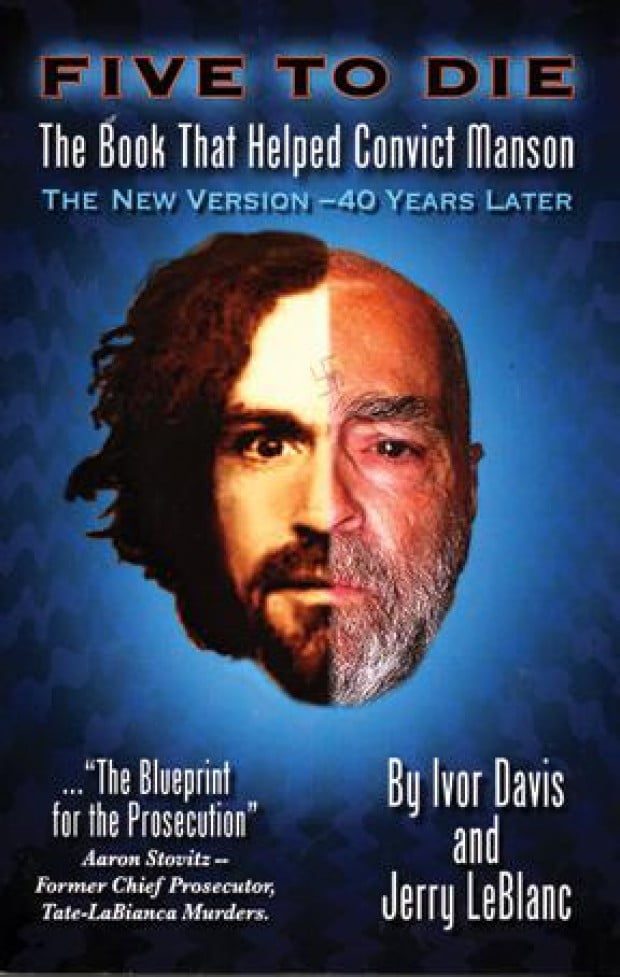A local author looks back.
By Kim Devore 1 Staff Writer
The summer of 1969 was a turbulent time defined by milestones both good and bad-the war in Vietnam, the peace at Woodstock. It was the year we put a man on the moon and discovered the grisly acts of a man most evil-Charles Manson.
Forty years ago this week, the Tate-LaBianca murders shocked the world. Author Ivor Davis in his book “Five to Die” chronicled the horrific details. The former Malibu resident released his book five months before the Tate-LaBianca murder trials began in 1970. The original chief prosecutor in the case, Aaron Stovitz, called Davis’ book “the blueprint for the prosecution.”
On Aug. 9, 1969, Davis awoke to the news that five people had been savagely slaughtered in the Benedict Canyon area of Beverly Hills. The victims were high profile. Manson’s crazed band of drugged up followers had butchered actress Sharon Tate, wife of film director Roman Polanski. She was eight and half months pregnant. They also massacred coffee heiress Abigail Folger, her boyfriend Voytek Frykowski, celebrity hair stylist Jay Sebring as well as 18-year-old Steven Parent.
Another killing spree was to follow, this time involving Los Angeles businessman Leno LaBianca and his 38-year old wife Rosemary. Their mutilated bodies were discovered the next day at their home in Los Feliz.
At the time, Davis was a West Coast correspondent for the London Daily Express. His editors immediately assigned him to the case asking him to dig deep and get the back-story behind one of the most sensational mass murders in history.
Together with Jerry Leblanc, a freelance reporter for the Reuters news agency, Davis began to investigate the Manson “Family.” He learned the details of how Manson recruited his clan and how he controlled them.
“We explained the methods and motives behind the Manson family’s criminal lifestyle,” Davis said. “Their ritualistic drug-fueled life made it possible for their guru to convince a young gang of runaways to commit the most savage, violent killings anyone could ever remember. He took a bunch of mostly middle-class American kids and turned them into a killing machine.”
The trail led to Spahn Ranch, where the Manson family lived, and even to Malibu. The local connection was songwriter/record producer Terry Melcher. (Melcher, the son of Doris Day, worked with the likes of Ry Cooder, the Byrds and the Beach Boys. He died in November of 2004.)
“Terry told me he had promised to give Manson a recording contract,” Davis said. “He thinks they were after him. He was terrified.” Melcher had once lived at the Tate home but had moved to his mom’s Malibu beach house with his then girlfriend actress Candice Bergen before the murders took place.
Davis interviewed everyone from Melcher to Polanski and members of the Manson clan. He also covered the case in court. The trials dragged on for years, but in the end, Manson and his followers, including Charles “Tex” Watson, Susan Atkins, Leslie Van Houten, Linda Kasabian and Patricia Krenwinkle, were convicted on charges of first-degree murder and sentenced to death. However, when the state of California abolished the death penalty in 1972, their sentences were commuted to life.
Davis’ 1970 book has been rereleased and updated. The first edition print, however, has become somewhat of a collector’s item. Published by Holloway House, it is listed for sale at Amazon.com for $80. A seller on the Web site oddballbooks.com has it listed at $100.
The Manson family members are now in their ’60s and ’70s and all remain imprisoned.
Atkins, who is dying from cancer, has asked to be released from prison to die at home. Her next hearing is scheduled for Sept. 2.
Auteur John Waters has publicly argued for Van Houten’s release in a five-part blog on the Web site huffingtonpost.com titled “Leslie Van Houten: A Friendship.” Waters befriended the convicted killer after she turned him down for an interview for Rolling Stone magazine after which he continued to visit her in prison. She has been denied parole 18 times to date.
Manson has been denied parole 11 times, the last in 2007.
Kasabian, Watson and Krenwinkle have all been repeatedly denied parole.
Editor Laura Tate contributed to this story.

